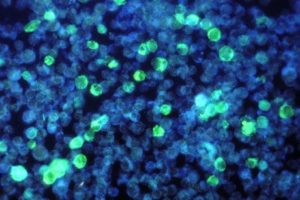journal of virology
Tips from the journals of the American Society for Microbiology
Nanoparticle Vaccine Protects Against Stomach Flu
A new vaccine strategy using nanoparticles as carriers may be the key to developing a vaccine against norovirus, one of the most common causes of foodborne disease in the United States. Researcher…
New research aims to shut down viral assembly line
Under the electron microscope, a coronavirus may resemble a spiny sea urchin or appear crownlike, (the shape from which this family of pathogens takes its name). Previously recognized as the second leading cause of the common cold in humans a…
BUSM researchers show an oncolytic virus switches off cancer cell surival signal
(Boston) — Researchers from Boston University School of Medicine (BUSM) have identified a mechanism by which specific viruses acting as oncolytic agents can enter and kill cancer cells. This finding, which is currently featured in an online editio…
Swine flu variant linked to fatal cases might have disabled the clearing mechanism of lungs
A variant of last year’s pandemic influenza linked to fatal cases carried a mutation that enabled it to infect a different subset of cells lining the airway, according to new research. The study, due to be published next week in the Journal of Virol…
U of M researchers identify 2 FDA approved drugs that may fight HIV
Researchers at the University of Minnesota Academic Health Center have identified two drugs that, when combined, may serve as an effective treatment for HIV.
The two drugs, decitabine and gemcitabine — both FDA approved and currently used in pre…
Potential HIV drug keeps virus out of cells
SALT LAKE CITY — Following up a pioneering 2007 proof-of-concept study, a University of Utah biochemist and colleagues have developed a promising new anti-HIV drug candidate, PIE12-trimer, that prevents HIV from attacking human cells.
Michael S…
Sometimes in science no news is good news
Sometimes finding out what doesn?t matter in science is just as important as finding what does. That?s the case for a study that looked at the function of the viral protein, MTase1. Researchers found that the rate of virus replication in tissue culture was not affected when MTase1 was removed. The finding is important as researchers look for what proteins are essential and how they function in cells, potentially providing answers to everything from insect control to the control of human diseases such as smallpox.
Researchers find oral transmission of HIV possible
When exposed to high levels of human immunodeficiency virus (HIV), the cells lining the mouth can develop a low-level infection, a finding that increases our understanding of the risks of oral transmission of the disease. Researchers from Charles R. Drew University and the University of California, Los Angeles, report their findings in the March 2003 issue of the Journal of Virology. “The majority of HIV type 1 infections occur via mucosal contact, and there are several reports indicating that the oral mucosa may be one route of exposure,” say the researchers. “It is difficult to confirm that oral mucosa is a major transmission portal because of the correlation between oral-genital contact and other transmission risk behaviors.”
Antibodies critical for fighting West Nile Virus infection
Researchers have found that immune cells called B cells and the antibodies they produce play a critical early role in defending the body against West Nile Virus. The results are published in the February issue of the Journal of Virology. Mice that lacked B cells and antibodies were completely unable to combat the virus. They developed serious brain and spinal-cord infection and ultimately died.


